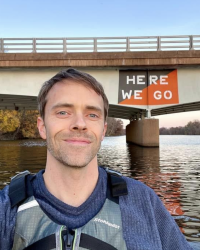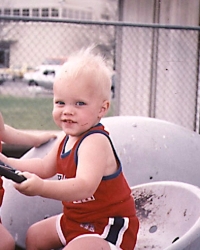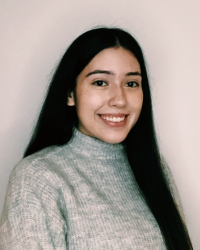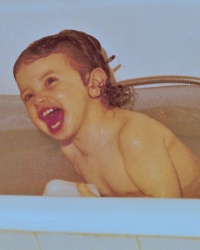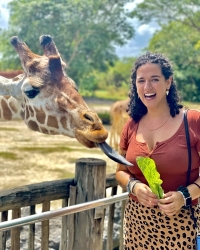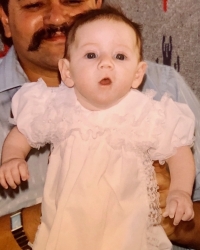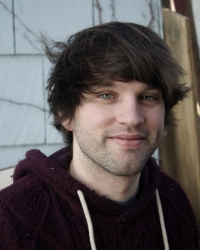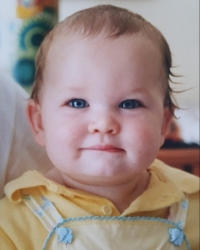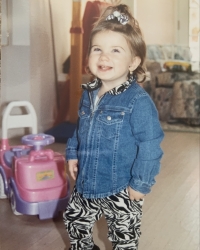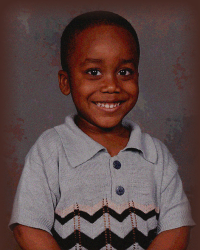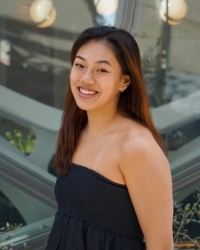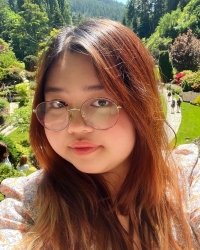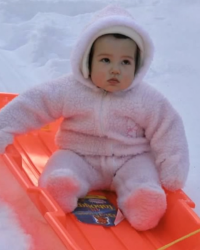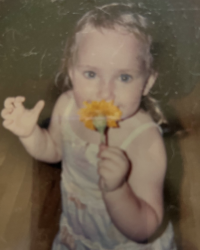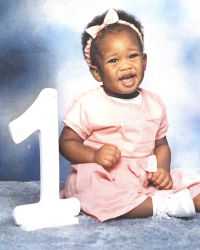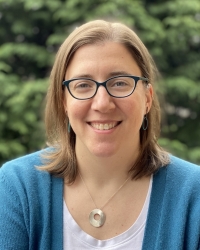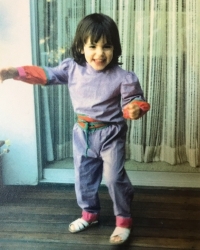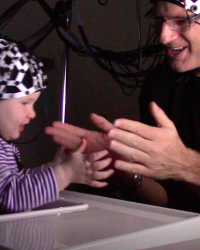Potter, C. E., & Lew-Williams, C. (in press). Language development in children's natural environments: People, places, and things. Advances in Child Development and Behavior.
Nencheva, M. L., Nook, E. C., Thornton, M. A., Lew-Williams, C., & Tamir, D. I. (in press). The emergence of organized emotion dynamics in childhood. Affective Science.
Kosie, J. E., & Lew-Williams, C. (in press). Infant-directed communication: Examining the many dimensions of everyday caregiver-child interactions. Developmental Science.
Soderstrom, M., et al. (in press). Testing the relationship between preferences for infant-directed speech and vocabulary development: A multi-lab study. Journal of Child Language.
Okocha, A., Burke, N., & Lew-Williams, C. (in press). Infants and toddlers in the United States with more close relationships have larger vocabularies. Journal of Experimental Psychology: General.
Potter, C. E., & Lew-Williams, C. (in press). Frequent vs. infrequent words shape toddlers' real-time sentence comprehension. Journal of Child Language.
Tamis-LeMonda, C. S., Gonzalez, S. L., Xu, M., Herzberg, O., Kachergis, G., Jayaraman, S., Soska, K. C., Gilmore, R. O., Adolph, K. E., Bornstein, M. H., Casasola, M., Fausey, C. M., Frank, M. C., Goldin-Meadow, S., Gros-Louis, J., Hirsh-Pasek, K., Iverson, J., Lew-Williams, C., MacWhinney, B., Marchman, V. A., Naigles, L., Namy, L., Perry, L. K., Rowe, M., Sheya, A., Soderstrom, M., Song, L., Walle, E., Warlaumont, A. S., Yoshida, H., Yu, C., & Yurovsky, D. (2024). Comparing apples to manzanas and oranges to naranjas: A new measure of English-Spanish vocabulary for dual language learners. Infancy, 29, 302-326.
Kosie, J. E., & Lew-Williams, C. (2024). Open science considerations for descriptive research in developmental science. Infant and Child Development, 33, e2377.
Singh, L., Barokova, M. D., Baumgartner, H. A., Lopera-Perez, D. C., Omane, P. O., Sheskin, M., Yuen, F. L., Wu, Y., Alcock, K. J., Altmann, E. C., Bazhydai, M., Carstensen, A., Chan, K. C. J., Chuan-Peng, H., Dal Ben, R., Franchin, L., Kosie, J. E., Lew-Williams, C., Okocha, A., Reinelt, T., Schuwerk, T., Soderstrom, M., Tsui, A. S. M., & Frank, M. C. (2024). A unified approach to demographic data collection for research with young children across diverse cultures. Developmental Psychology, 60, 211-227.
Weisleder, A., Lew-Williams, C., Garcia, L. P., Okocha, A., Kosie, J. E., Carstensen, A., Tomaselli, N., & Lichand, G. (2024). Language interactions. In N. Tomaselli, L., Dzekedzeke, G. Lichand, & J. Phuka (Eds.)., Using wearable sensors in practice: A user guide for collecting data on parental inputs and child development using wearable devices (pp. 22-27). UNICEF.
Jaffe-Dax, S., Potter, C. E., Leung, T. S., Emberson, L. L., & Lew-Williams, C. (2023). The influence of memory on visual perception in infants, children, and adults. Cognitive Science, 47, e13381.
Casey, K., Potter, C. E., Lew-Williams, C., & Wojcik, E. H. (2023). Moving beyond 'nouns in the lab': Using naturalistic data to understand why infants' first words include uh-oh and hi. Developmental Psychology, 59, 2162-2173.
Tsui, R. K.-Y., Kosie, J. E., Fibla, L., Lew-Williams, C., & Byers-Heinlein, K. (2023). Patterns of language switching and bilingual children's word learning: An experiment across two communities. Translational Issues in Psychological Science, 9, 323-337.
Kremin, L. V., Jardak, A., Lew-Williams, C., & Byers-Heinlein, K. (2023). Bilingual children's comprehension of code-switching at an uninformative adjective. Language Development Research, 3, 249-276.
Erel, Y., Adams Shannon, K., Scott, K., Cao, P., Tan, X., Hart, P., Kline Struhl, M., Chu, J., Raz, G., Piccolo, S., Mei, C., Potter, C. E., Jaffe-Dax, S., Lew-Williams, C., Tenenbaum, J., Fairchild, K., Bermano, A., & Liu, S. (2023). iCatcher+: Robust and automated annotation of infant gaze from videos collected in the lab and online. Advances in Methods and Practices in Psychological Science, 6, 1-23.
Nencheva, M. L., Tamir, D. I., & Lew-Williams, C. (2023). Caregiver speech predicts the emergence of children's emotion vocabulary. Child Development, 29, 585-602.
Reuter, T., Mazzei, C. A., Lew-Williams, C., & Emberson, L. L. (2023). Infants' lexical comprehension and lexical anticipation abilities are closely linked in early language development. Infancy, 28, 532-549.
Lee, C., & Lew-Williams, C. (2023). The dynamic functions of social cues during children's word learning. Infant and Child Development, 32, e2372.
Zettersten, M., Cutler, M., & Lew-Williams, C. (2023). Active information-seeking in support of learning extensions of novel words. Proceedings of the 45th Annual Conference of the Cognitive Science Society.
Rane, S., Nencheva, M., Wang, Z., Lew-Williams, C., Russakovsky, O., & Griffiths, T. L. (2023). Predicting word learning in children from the performance of computer vision systems. Proceedings of the 45th Annual Conference of the Cognitive Science Society.
Savage, P. E., Jacoby, N., Margulis, E. H., Daikoku, H., Anglada-Tort, M., Castelo-Branco, S. E.-S., Nweke, F. E., Fujii, S., Hegde, S., Chuan-Peng, H., Jabbour, J., Lew-Williams, C., Mangalagiu, D., McNamara, R., Müllensiefen, D., Opondo, P., Patel, A., & Schippers, H. (2023). Building sustainable global collaborative networks: Recommendations from music studies and the social sciences. In E. H. Margulis, D. Loughridge, & P. Loui (Eds.), The science-music borderlands: Reckoning with the past, imagining the future. MIT Press.
Potter, C. E., & Lew-Williams, C. (2023). The psycholinguistics of early bilingualism. In A. Godfroid & H. Hopp (Eds.), The Routledge handbook of second language acquisition and psycholinguistics. New York: Taylor & Francis/Routledge.
Lee, C., & Lew-Williams, C. (2022). Speech and social cues combine at discourse boundaries to promote word learning. Cognitive Development, 64, 101254.
Nencheva, M. I., & Lew-Williams, C. (2022). Understanding why infant-directed speech supports learning: A dynamic attention perspective. Developmental Review, 66, 101047.
Erel, Y., Potter, C. E., Jaffe-Dax, S., Lew-Williams, C., & Bermano, A. H. (2022). iCatcher: A Neural network approach for automated coding of young children's eye movements. Infancy, 27, 765-779.
Fibla, L., Kosie, J. E., Kircher, R., Lew-Williams, C., & Byers-Heinlein, K. (2022). Bilingual language development in infancy: What can we do to support bilingual families? Policy Insights from Behavioral and Brain Sciences, 9, 35-43.
Byers-Heinlein, K., Jardak, A., Fourakis, E., & Lew-Williams, C. (2022). Effects of language mixing on bilingual children's word learning. Bilingualism: Language and Cognition, 25, 55-69.
Reuter, T., Sullivan, M., & Lew-Williams, C. (2022). Look at that: Spatial deixis reveals experience-related differences in prediction. Language Acquisition, 29, 1-26.
Visser et al. (2022). Improving the generalizability of infant psychological research: The ManyBabies model. [Commentary on "The generalizability crisis" by T. Yarkoni]. Behavioral and Brain Sciences, 45, 63-65.
Potter, C. E., & Lew-Williams, C. (2022). Differences in vocabulary growth across groups and individuals. In A. Papafragou, J. Trueswell, & L. Gleitman (Eds.), The Oxford handbook of the mental lexicon. New York: Oxford.
Floyd, S., Dalawella, K., Goldberg, A. E., Lew-Williams, C., & Griffiths, T. L. (2021). Modeling rules and similarity in colexification. Proceedings of the 43rd Annual Conference of the Cognitive Science Society.
Mon, S. K., Nencheva, M., Citron, F. M. M., Lew-Williams, C., & Goldberg, A. E. (2021). Conventional metaphors elicit greater real-time engagement than literal paraphrases or concrete sentences. Journal of Memory and Language, 121, 104285.
Schott, E., Mastroberardino, M., Fourakis, E., Lew-Williams, C., & Byers-Heinlein, K. (2021). Fine-tuning language discrimination: Monolingual and bilingual infants' detection of language switching. Infancy, 26, 1037-1056.
Piazza, E. A., Nencheva, M., & Lew-Williams, C. (2021). The development of communication across timescales. Current Directions in Psychological Science, 30, 459-467.
Piazza, E. A., Cohen, A., Trach, J., E., & Lew-Williams, C. (2021). Neural synchrony predicts children's learning of novel words. Cognition, 214, 104752.
Breitfeld, E., Potter, C. E., & Lew-Williams, C. (2021). Children simultaneously learn multiple dimensions of information during shared book reading. Cognition and Development, 22, 744-766.
Byers-Heinlein, K., Tsui, R. K.-Y., van Renswoude, D., Barr, R., Black, A., Brown, A., Colomer, M., Durrant, S., Gampe, A., Gonzalez-Gomez, N., Hay, J. F., Hernik, M., Jartó, M., Kovács, A. M., Laoun-Rubenstein, A., Lew-Williams, C., Liszkowski, U., Liu, L., Noble, C., Potter, C. E., Rocha-Hidalgo, J., Sebastian-Galles, N., Soderstrom, M., Visser, I., Waddell, C., Wermelinger, S., & Singh, L. (2021). The development of gaze following in monolingual and bilingual infants: A multi-laboratory study. Infancy, 26, 4-38.
Byers-Heinlein, K., Tsui, A. S. M., Bergmann, C., Black, A., Brown, A., Carbajal, M. J., Durrant, S., Fennell, C. T., Fiévet, A.-C., Frank, M. C., Gampe, A., Gervain, J., Gonzalez-Gomez, N., Hamlin, J. K., Havron, N., Hernik, M., Kerr, S., Killam, H., Klassen, K., Kosie, J., E., Kovács, A. M., Lew-Williams, C., Liu, L., Marino, C., Mastroberardino, M., Mateu, V., Noble, C., Orena, A. J., Polka, L., Potter, C. E., Singh, L., Soderstrom, M., Sundara, M., Waddell, C., Werker, J., & Wermelinger, S. (2021). A multi-lab study of bilingual infants: Exploring the preference for infant-directed speech. Advances in Methods and Practices in Psychological Science, 4, 1-30.
Reuter, T., Dalawella, K., & Lew-Williams, C. (2021). Adults and children predict in complex and variable referential contexts. Language, Cognition and Neuroscience, 36, 474-490.
Nencheva, M. L., Piazza, E. A., & Lew-Williams, C. (2021). The moment-to-moment pitch dynamics of child-directed speech shape toddlers' attention and learning. Developmental Science, 24, e12997.
Olson, R. H., Pomper, R., Potter, C. E., Hay, J. F., Saffran, J. R., Ellis Weismer, S., & Lew-Williams, C. (2020). Peyecoder: An open-source program for coding eye movements (Version v1.1.5). Zenodo. http://doi.org/10.5281/zenodo.4313832
Jaffe-Dax, S., Potter, C. E., Leung, T., Lew-Williams, C., & Emberson, L. (2020). Memory integration into visual perception in infancy, childhood, and adulthood. Proceedings of the 42nd Annual Conference of the Cognitive Science Society.
Tippenhauer, N., Fourakis, E. R., Watson, D. G., & Lew-Williams, C. (2020). The scope of audience design in child-directed speech: Parents' tailoring of word lengths for adult versus child listeners. Journal of Experimental Psychology: Learning, Memory, and Cognition, 46, 2163-2178.
Byers-Heinlein, K., Bergmann, C., Davies, C., Frank, M. C., Hamlin, K., Kline, M., Kominsky, J., Kosie, J. E., Lew-Williams, C., Liu, L., Singh, L., Waddell, C., Zettersten, M., & Soderstrom, M. (2020). Building a collaborative psychological science: Lessons learned from ManyBabies 1. Canadian Psychology/Psychologie canadienne, 61, 349-363.
The ManyBabies Consortium (2020). Quantifying sources of variability in infancy research using the infant-directed speech preference. Advances in Methods and Practices in Psychological Science, 3, 24-52.
Piazza, E. A., Hasenfratz, L., Hasson, U., & Lew-Williams, C. (2020). Infant and adult brains are coupled to the dynamics of natural communication. Psychological Science, 31, 6-17.
Schwab, J. F., & Lew-Williams, C. (2020). Discontinuity of reference hinders children's learning of new words. Child Development, 91, e29-e41.
Floyd, S., Lew-Williams, C., & Goldberg, A. E. (2020). Toddlers assign word labels to multiple polyemous meanings. Proceedings of the 42nd Annual Conference of the Cognitive Science Society.
Emberson, L., Loncar, N., Mazzei, C., Treves, I., & Goldberg, A. (2019). The blowfish effect: Children and adults use atypical exemplars to infer more narrow categories during word learning. Journal of Child Language, 1-17. doi:10.1017/S0305000919000266
Reuter, T., Borovsky, A., & Lew-Williams, C. (2019). Predict and redirect: Prediction errors support children's word learning. Developmental Psychology, 55, 1656-1665.
Potter, C. E., Fourakis, E., Morin-Lessard, E., Byers-Heinlein, K., & Lew-Williams, C. (2019). Bilingual toddlers' comprehension of mixed sentences is asymmetrical across their two languages. Developmental Science, 22, e12794.
Potter, C. E., & Lew-Williams, C. (2019). Infants' selective use of reliable cues in multidimensional language input. Developmental Psychology, 55, 1-8.
Rabagliati, H., Ferguson, B., & Lew-Williams, C. (2019). The profile of abstract rule learning in infancy: Meta-analytic and experimental evidence. Developmental Science, 22, e12704.
Lew-Williams, C., Ferguson, B., Abu-Zhaya, R., & Seidl, A. (2019). Social touch interacts with infants' learning of auditory patterns. Developmental Cognitive Neuroscience, 35, 66-74.
Floyd, S., Lew-Williams, C., & Goldberg, A. E. (2019). Children, more than adults rely on similarity to access multiple meanings of words. Proceedings of the 41st Annual Conference of the Cognitive Science Society.
Potter, C. E., Fourakis, E., Morin-Lessard, E., Byers-Heinlein, K., & Lew-Williams, C. (2018). Bilingual infants process mixed sentences differently in their two languages. Proceedings of the 40th Annual Conference of the Cognitive Science Society.
Reuter, T., Emberson, L. L., Romberg, A. R., & Lew-Williams, C. (2018). Individual differences in nonverbal prediction and vocabulary size in infancy. Cognition, 176, 215-219.
Schwab, J. F., Lew-Williams, C., & Goldberg, A. (2018). When regularization gets it wrong: Children over-simplify language input only in production. Journal of Child Language, 45, 1054-1072.
Byers-Heinlein, K., & Lew-Williams, C. (2018). Language comprehension in monolingual and bilingual children. In E. M. Fernández & H. S. Cairns (Eds.), The handbook of psycholinguistics (pp. 516-535). Hoboken, NJ: Wiley.
Schwab, J. F., Rowe, M. L., Cabrera, N. J., & Lew-Williams, C. (2018). Fathers' repetition of words is coupled with children's vocabularies. Journal of Experimental Child Psychology, 166, 437-450.
Fennell, C., & Lew-Williams, C. (2018). Early bilingual word learning. In G. Westermann & N. Mani (Eds.), Early word learning (pp. 110-122). New York: Routledge.
Piazza, E. A., Iordan, M. C., & Lew-Williams, C. (2017). Mothers consistently alter their unique vocal fingerprints when communicating with infants. Current Biology, 27, 3162-3167.
Byers-Heinlein, K., Morin-Lessard, E., & Lew-Williams, C. (2017). Bilingual infants control their languages as they listen. Proceedings of the National Academy of Sciences, 114, 9032-9037.
Lew-Williams, C., & Weisleder, A. (2017). How do little kids learn language? Frontiers for Young Minds, 5, 1-8.
Grieco-Calub, T. M., Simeon, K. M., Snyder, H. E., & Lew-Williams, C. (2017). Word segmentation from noise-band vocoded speech. Language, Cognition and Neuroscience, 32, 1344-1356.
Schwab, J. F., & Lew-Williams, C. (2017). Discourse continuity promotes children’s learning of new object labels. Proceedings of the 39th Annual Conference of the Cognitive Science Society.
Lew-Williams, C. (2017). Specific referential contexts shape efficiency in second language processing: Three eye-tracking experiments with 6- and 10-year-old children in Spanish immersion schools. Annual Review of Applied Linguistics, 37, 128-147.
Frank, M. C., Bergelson, E., Bergmann, C., Cristia, A., Floccia, C., Gervain, J., Hamlin, J. K., Hannon, E. E., Kline, M., Levelt, C., Lew-Williams, C., Nazzi, T., Panneton, R., Rabagliati, H., Soderstrom, M., Sullivan, J., Waxman, S., Yurovsky, D. (2017). A collaborative approach to infant research: Promoting reproducibility, best practices, and theory-building. Infancy, 22, 421-435.
Ferguson, B., & Lew-Williams, C. (2016). Communicative signals support abstract rule learning by 7-month-old infants. Scientific Reports, 6, 25434.
Schwab, J. F., & Lew-Williams, C. (2016). Language learning, socioeconomic status, and child-directed speech. WIREs Cognitive Science, 7, 264-275.
Lew-Williams, C. (2016). Using the looking-while-listening procedure for second language research. In A. Mackey & E. Marsden (Eds.), Advancing methodology and practice: The IRIS repository of instruments for research into second languages (pp. 43-57). New York: Routledge.
Lew-Williams, C. (2015). Infants’ history of distributional learning in real time. (Commentary on Phillips and Ehrenhofer’s The role of language processing in language acquisition). Linguistic Approaches to Bilingualism, 5, 494-498.
Graf Estes, K., & Lew-Williams, C. (2015). Listening through voices: Infant statistical word segmentation across multiple speakers. Developmental Psychology, 51, 1517-1528.
Ferguson, B., & Lew-Williams, C. (2014). Communicative signals promote abstract rule learning by 7-month-old infants. Proceedings of the 36th Annual Meeting of the Cognitive Science Society.
Byers-Heinlein, K., & Lew-Williams, C. (2013). Bilingualism in the early years: What the science says. Learning Landscapes, 7, 95-112.
Grüter, T., Lew-Williams, C., & Fernald, A. (2012). Grammatical gender in L2: A production or a real-time processing problem? Second Language Research, 28, 191-215.
Lew-Williams, C., & Saffran, J. R. (2012). All words are not created equal: Expectations about word length guide infant statistical learning. Cognition, 122, 241-246.
Lew-Williams, C., Pelucchi, B., & Saffran, J. R. (2011). Isolated words enhance statistical language learning in infancy. Developmental Science, 14, 1323-1329.
Lew-Williams, C., & Fernald, A. (2010). Real-time processing of gender-marked articles by native and non-native Spanish speakers. Journal of Memory and Language, 63, 447-464.
Lew-Williams, C., & Fernald, A. (2009). Fluency in using morphosyntactic cues to establish reference: How do native and non-native speakers differ? Proceedings of the 33rd Annual Boston University Conference on Language Development.
Lew-Williams, C., & Fernald, A. (2008). How first and second language learners use predictive cues in online sentence interpretation in Spanish and English. Proceedings of the 31st Annual Boston University Conference on Language Development.
Lew-Williams, C., & Fernald, A. (2007). Young children learning Spanish make rapid use of grammatical gender in spoken word recognition. Psychological Science, 33, 193-198.
The Baby Lab in Princeton News!
The Princeton Baby was featured on the Princeton University website in the article "Baby Talk: Looking inside young minds for clues to early learning" by Michael Hotchkiss! Thanks Michael for the inside look at our research and also a big thank you to Denise Applewhite of the Princeton University Office of Communications for the fun photos from a visit.
Dr. Lauren Emberson's research published in PNAS
Along with collaborators John Richards and Richard Aslin, co-director Lauren Emberson's paper "Top-dow modulation in the infant brain: Learning-induced expectations rapidly affect the sensory cortex at 6 months" was published in the competitive journal Proceedings of the National Academy of Sciences of the United States of America. The findings in the paper suggest that even at as earlier as 6 months of age, there is neural architecture present in infancy that allows for top-down modulation in learning. Congratulations to Lauren for the honorable recognition of her continuing contributions to the developmental psychology!
The full article can be viewed here.
Welcome Alex and Carolyn!
The start of the fall semester also marked the start for two new lab members in the Princeton Baby. Alex Boldin is being welcomed as a new Research Specialist under Dr. Lauren Emberson. Alex received her B.A. in Physics and Mathematics from Macalester College and is diving right into data analysis and fNIRS preparation in lab. Carolyn Mazzei is being welcomed as the Lab Manager for Lauren Emberson. She received her B.S. in Cognitive Science and B.A. in Psychology from University of Delaware and will be working to recruit more tiny tigers to teach the Princeton students a thing or two in the Baby Lab studies.
Interdisciplinary Advances in Statistical Learning
In late June 2015, the Basque Center on Cognition, Brain and Language hosted a workshop on the Interdisciplinary Advanced in Statistical Learning. Researchers from many countries converged for 3 excellent days of talks on how we learn from the environment and how learning supports development. Research from the Princeton Baby Lab was well represented at this conference: Both Lab Directors gave well attended talks. Dr. Lauren Emberson gave a talk entitled "How Abstract is Statistical Learning? Comparing Learning Across Visual and Auditory Perceptual Modalities In Infancy." and Dr. Casey Lew-Williams gave a talk entitled "Noise-band vocoding interferes with auditory statistical learning in adults."

Congrats and Welcome to Elise Piazza!
In the Fall of 2015, we'll be joined by Elise Piazza! She's currently a PhD Candidate at UBerkeley (PI: Michael Silver). She's won the very pretigious CV Starr Fellowship through the Princeton Neuroscience Institute (PNI) to start a postdoc with Casey Lew-Williams and Uri Hasson. The CV Starr Fellowship is intended to recruit "exceptional individuals" who wish to pursue neuroscience postdocs at Princeton. Elise will be heading up a developmental imaging project to track how interpersonal neural synchrony emerges through language development using fNIRS. Lauren Emberson will also provide fNIRS mentorship for the project.
Congrats on this incredible honor Elise! Good luck with your PhD defense, and looking forward to having you in the Princeton Baby Lab in the Fall!
For more information about Elise, visit her personal website.
Electronic versions are provided as a professional courtesy to ensure timely dissemination of academic work for individual, noncommercial purposes. Copyright and all rights therein reside with the respective copyright holders.
Graduate Students
Students interested in pursuing graduate work would apply to work directly with Dr. Lauren Emberson or Dr. Casey Lew-Williams through the graduate school. However, Princeton Psychology is a highly collaborative department and co-advising of students between multiple faculty is a possibility under the right circumstances. Applications are typically due in mid-December. Interested students should email Dr. Lauren Emberson and/or Dr. Casey Lew-Williams (depending on their individual interests) early in the process to determine whether they would be a good fit for the program and the lab.
Are you new to the Princeton Baby Lab, Big Kid Lab, & Teen Lab?
Please fill out the fields below, and we will contact you soon about our in-person and online studies!
To request accessibility information or to request an accommodation for you or your child, please contact Ruby Trujillo (ruby.trujillo@princeton.edu) or call 609-258-6577.
If you will be traveling to the lab, here are directions!
Congrats to Jessica Schwab!
Congrats to Princeton Baby Lab graduate student, Jessica Schwab, on her admission to the Joint PhD program in Social Policy in the Woodrow Wilson School of Policy. Jessica's work examines how the social environment supports langugage development and particularly word learning. An incredible honor and an incredible opportunity!! Congrats Jessie!
For more information about Jessie and her work, please see her information on the Princeton Baby Lab People page.
What is developmental research and why is it important?

At the Princeton Baby Lab, we study how babies and young children learn to talk, see, and understand the world. This is an exciting time for research on child development, because we have the ability to study how a child’s ability to learn and their experiences work together to support their development.
Our research is important for many reasons. It helps us understand how the developing mind works, how biology and experience shape our lives, how caregivers can best support children’s development, and how we can help children at-risk for poor developmental outcomes. Our main goal is to develop a scientific understanding about how children develop, but our science is useful beyond the geographic and digital borders of universities: it helps us figure out how to improve children’s developmental outcomes.
We depend heavily on the New Jersey community to help us out, so please consider volunteering a little bit of your time for our fun studies. See below for a few of the scientific questions we are trying to answer!
If you are a student and want more information about how to get involved in the research at the Baby Lab, please click here.
If you are a parent or caregiver and want more information about what it means to be involved in our research, please click here for more information.
We wish to acknowledge that the land on which we gather to work, study, and learn is part of the unceded territory of the Nanticoke Lenni-Lenape Tribal Nation.
Testing wysiwyg editor (Body Field)
Some text below:
Lorem ipsum dolor sit amet, consectetur adipiscing elit, sed do eiusmod tempor incididunt ut labore et dolore magna aliqua. Ut enim ad minim veniam, quis nostrud exercitation ullamco laboris nisi ut aliquip ex ea commodo consequat. Duis aute irure dolor in reprehenderit in voluptate velit esse cillum dolore eu fugiat nulla pariatur. Excepteur sint occaecat cupidatat non proident, sunt in culpa qui officia deserunt mollit anim id est laborum.
Now some media stuff:
Undergraduates
The Baby Lab is seeking motivated and organized undergraduate research assistants to join our team. Studies will focus on questions of infant language development, perception, and learning.
Tasks will include managing the lab phones and email for participant recruitment and scheduling, data collection and entry, and interacting with the infant and families during their visits to the lab. Work hours will include a weekly lab meeting to discuss relevant studies and allow RAs to further learn about the research process. Applicants should demonstrate an interest in the study topics. While no previous research experience is required, it would be advantageous. Students will be selected based on their dedication to the kinds of questions we ask in our research, as well as work ethic. Bilingual Spanish speakers are highly encouraged to apply; however, Spanish language skills are not required to apply.
Please send a CV/resume and a cover letter describing why you are interested in being involved in the Baby Lab to annie.schwartzstein@princeton.edu and taylorm@princeton.edu by Monday, January 18th with the subject line "Research Assistant Application".
We are always looking for families to volunteer their time to visit us in the Baby Lab. We all know you live very busy lives so we appreciate you volunteering your time to developmental science! If you choose to participate, our studies offer free parking, free child care for any other children that you have, a small monetary compensation, and a toy or t-shirt to say "thank you" to our young participants.
Our studies are designed to be fun and engaging for your child!! Appointments are usually 30-45 minutes long. Studies usually entail your child hearing sounds or seeing pictures or a play session with one of our researchers. During some studies we will video tape your child so that we can watch and determine what your child learned from the study.
Click on the frequently asked questions (FAQ) below for more information. If you would like to talk with someone from the Princeton Baby Lab, you may call (609-258-6577), email us (babylab@princeton.edu) or click here to have us contact you!

How do young children learn, and how does their incredible ability to learn support their development?
We are a research group in the Department of Psychology at Princeton University,
directed by Dr. Lauren Emberson and Dr. Casey Lew-Williams.
We would be very grateful if you volunteered your time by participating in our ongoing research.
Lab Director
Director
Ph.D., 2009, Stanford University
Prof. Casey Lew-Williams studies how babies learn, with a particular focus on language and communication. He is interested in how babies learn and generalize patterns, how toddlers efficiently process what their parents say, how home language experience shapes learning, and why some children learn more easily than others. He studies various populations — including children learning two languages and children growing up in poverty — to ask questions about the foundations and high-stakes consequences of early learning.
Research Staff
Lab Manager
B.A., 2022, University of Chicago
Alyssa is commited to better understanding children's dynamic, diverse language experiences. Broadly, she is interested in exploring how aspects of children's everyday environments support early language learning and communication. Alyssa has previously worked with Dr. Susan Goldin-Meadow and Dr. Marisa Casillas at the University of Chicago, and Dr. Meredith Rowe at the Harvard Graduate School of Education. Outside of the lab, Alyssa enjoys caring for her tree frog, baking, and taking photographs.
Lab Manager
B.S. Human Development, Cornell University
Ruby is dedicated to researching how learning happens during early childhood. Broadly, she is interested in how the development of linguistic knowledge supports, and is supported by, other kinds of learning. Ruby previously studies mental rotation and other early-emerging spatial skills with Dr. Marianella Casasola at Cornell University. When she is not in the lab, Ruby can be found engaging in the nerdiest possible hobbies including playing boardgames and reading Shakespeare.
Research Scholar
Ph.D., 2011 Jerusalem
Liat has completed her PhD on learning and motivation in early childhood. At Ariel Knafo-Noam’s Social Development Lab in Jerusalem she learned how to use behavioral genetics to investigate the interplay of nature and nurture in the development of prosocial behavior and the emergence of values. This work has ignited Liat’s keen interest in the question of how knowledge is transmitted across time, from generation to generation, and how it travels across space, via various forms of media such as books, audio recordings and videos. To do so, Liat is combining natural and realistic experimental set-ups with neuro-imaging approaches.
Postdoctoral Researchers
Postdoc
B.A., 2013, Indiana University
Ph.D., 2023, Cornell University
Steven studies the perceptual mechanisms that guide early communicative and language development. He is particularly interested in parent-child interaction and children's active role in shaping what is relevant for them to learn. In what ways do children use their own behaviors to spark interest in and continued learning about the social world throughout early development? If he's not in the lab, Steven is probably spending time cooking outside or taking his retired racing greyhound, Wendy, for a walk.
Postdoc
B.S., 2014, University of Tennessee
M.A., 2017, New York University
Ph.D., 2022, University of Miami
Stevie's interests broadly revolve around how features of children’s everyday environments and contexts influence their social interactions with caregivers. In her dissertation work she used automated measurements of children’s language and movement in inclusive preschool classrooms to understand how language interactions differ across activity contexts for children with and without developmental delays. In her free time, Stevie enjoys practicing yoga, trying out new cooking and baking recipes, and wandering around Philly with her dog Lula.
Postdoc
1st St.ex., 2013, Heidelberg University
Ph.D., 2020, University of Wisconsin-Madison
Martin is interested in language - how we learn it and what it helps us do. His research focuses on the active role that children play in the learning process. How do children seek out new information and make predictions about their environment (e.g., about word meanings)? Outside of the lab, Martin can usually be found chasing frisbees, sipping tea, or singing songs about Charles Darwin and/or cheese.
Graduate Students
Ph.D. Student
Nicole is interested in all things language- how it is learned, how it is used, and what this tells us about the brain. Nicole received her B.A. in Cognitive Science at University of Michigan (go blue!). Since then, she has worked as a lab manager for the Gelman Conceptual Development Lab and the Language Learning and Multisensory Brain (LLAMB) Lab, working closely with Susan Gelman, Richard Aslin, and David Lewkowicz. Outside of the lab, Nicole can be found taking long walks with her fur baby (Theo), cooking, or binge watching a series in record timing.
Ph.D. Student
B.A., 2019, Case Western Reserve University
Fueled by his curiosity for the magic in the world, Jonathan plans to examine how the inherent mechanisms for learning and memory may have evolved, developed, and interacted with one another to give rise to complex human cognitive abilities. Jonathan previously worked with Dr. Brooke Macnamara at Case Western Reserve and later managed the Turk-Browne lab at Yale University. Besides research, Jonathan is a competitive powerlifter and enjoys exploring new brunch spots with his dog.
Ph.D. Student
B.A. Psychology, 2021, Princeton University
Ph.D. Student
Ph.D. Student
B.S., 2016, Stanford
Mira is interested in the role of the social cues surrounding language and communication early in life, such as facial expressions and prosody. She is especially excited to explore the different time-scales at which these cues act - from subsecond moments in a single interaction, to the accumulating statistical information over longer periods of time. Outside of the lab, Mira can be found on long morning walks, painting or trying to find every single jazz concert in the area.
Senior Honors Students
Research Assistant
Harper Chambers (Class of 2024) is from Little Rock, Arkansas. He is a Neuroscience major with certificates in Cognitive Science and Latin American Studies. Harper is also enrolled in the Teacher Preparation Program where he will earn teaching licenses in Biology and Bilingual Education. He is fascinated by the impact of autistic behaviors on brain-brain interactions and social learning outcomes. Outside his courses and the Baby Lab, he works as a Fellow for the AccessAbility Center. After graduation, he hopes to combine his interests in neuroscience research, education, and disability by working in disability education policy.
Undergraduates
Research Assistant
Angelica Castro Lopez (Class of 2025) is from Los Angeles, California. She is a Neuroscience major on the pre-med track pursuing certificates in Spanish and Latino Studies. Angelica is interested in the intersection between bilingualism, its effect on learning, and how children are able to easily switch between languages as they grow! In the future, she hopes to attend medical school and work with families in underserved communities back home. Outside of the baby lab, she is a volunteer for the Princeton Penn Medical Center, social chair for Más Flow, a core volunteer for El Centro, and enjoys hanging out with friends.
Research Assistant
Jaime Chen (Class of 2025) is from Bellevue, Washington. She is a Neuroscience major on the pre-med track and pursuing a certificate in Cognitive Science. Jaime is interested in studying child development and learning, with a heavy emphasis on language acquisition. In parallel, she hopes to go into pediatrics where she can continue to work in child development through medicine. Outside the Baby Lab, Jaime is a Residential College Adviser, Peer Health Adviser, and Princeton Medical Center volunteer. In her free time, she enjoys swimming, art, and photography.
Research Assistant
Isabella Stahlman (Class of 2026) is from Atlanta, Georgia. She is a prospective Psychology major with an intended certificate in Entrepreneurship. She is particularly interested in the assessment and treatment of psychological disorders and mental illnesses, as well the study of how children learn and apply knowledge in educational settings. Outside of the Baby Lab, she works on the PR team for Tiger Trends, a fashion and lifestyle publication based at Princeton, and enjoys yoga and spin classes, spending time with friends, and binging reality TV shows.
Research Assistant
Ella Rosenberg (Class of 2025) is from Durham, North Carolina. She is a Neuroscience major with a certificate in Teacher Prep. She is interested in the science behind how kids learn, especially how they go from learning a language to reading in such a short amount of time. After graduation, she hopes to go into teaching for a few years before continuing her work with education in other ways. Outside of the baby lab, she enjoys spending time with friends and family, watching Duke basketball and working with children.
Research Assistant
Ahlanna Olson (Class of 2024) is a prospective Neuroscience major, looking at certificates in the Psychology and Molecular Biology areas. As a student on the pre-health track, Ahlanna is aiming to eventually attend Medical School, focusing on neuroscience research; Eventually, she aims to be a Pediatric Neurosurgeon. On campus, Ahlanna participates in Lightweight Women’s Crew, acapella performance, HPA, and PHLE extracurriculars; She also has worked as a Lab Technician in Frick Chemistry Laboratory, aiding with the General Chemistry 201/202 sequence.
Research Assistant
Jesus Arroyo (Class of 2024) is from La Puente California. He is a psychology major pursuing a Latin American Studies Certificate. Coming from a Spanish speaking household, he is interested in how bilingualism affects language development and in the ways social/cultural practices help emotional regulation. In the future he hopes to pursue a career in mental health counseling to help serve his community back home. On campus he works for the compost initiative in Forbes garden and enjoys playing basketball and learning to play the accordion.
Research Assistant
AJ Salcedo (Class of 2024) is from Queens, New York. He is a Anthropology major on the pre-medical track, and he is fascinated by the impact of social factors like race, gender, and socioeconomic status on childhood development. After graduating from Princeton, he plans to pursue medical school and potentially a career as a physician in psychiatry or family/pediatric medicine. Specifically, he is passionate about providing adequate healthcare (especially mental health) support and resources to disadvantaged communities. Outside of the Baby Lab, AJ enjoys spending time with his family and friends, creating artwork, and stepping on the Princeton University Step Team.
Research Assistant
Lynna Tran (Class of 2026) is from Seattle, Washington. She is a prospective psychology major with intended certificates in Linguistics and Cognitive Science. She is interested in researching language development, particularly regarding bilingualism and how socioeconomic status (SES) affects language learning. Lynna plans to pursue graduate school after Princeton and continue doing research in these areas, with hopes of one day becoming a professor and head of a lab herself. At Princeton, she is a Writing Center Fellow, a Matriculate Advising Fellow, a Peer Health Advisor, and an on-and-off editor for various campus publications. She also loves baking, (procrastinating on) writing, going on boba or coffee hangouts, and binge-watching shows.
Research Assistant
Hannah Van Dusen (Class of 2025) is from West Windsor, New Jersey. She is a prospective Psychology major pursuing certificates in Global Health and Health Policy and Environmental Studies. She is interested in the development of psychopathology in children, such as the influence of caregiver depression on childhood emotional development. In the future, Hannah hopes to pursue a career in pediatrics, potentially in the field of clinical neuropsychology. Outside of the lab, she volunteers for a suicide prevention line and the campus blood drive and enjoys planning tennis, reading classic books, and having game nights with family and friends.
Research Assistant
Jules Regan (class of 2025) is from Toms River, New Jersey. She is a prospective psychology major with possible certificates in the teachers preparatory program and neuroscience. Jules is interested in the intersection between early education and cognitive development, especially in how to optimize curriculums to best fit children's learning. Outside of the Baby Lab, Jules is the co-president of Academic Success Today, a member of the Princeton Neuroscience Network, and a member of the Scholars Institute Fellowship Program. She also loves to exercise, read new books, and binge Netflix.
Research Assistant
Aunyae Romeo (Class of 2026) is from Hamilton, New Jersey. She is a prospective Psychology major who intends to earn certificates in Gender and Sexuality Studies and African American Studies or Cognitive Science. She is interested in understanding the factors that contribute to childhood behavior development, as well as the development of individuality and sexuality in adolescence. Outside of the lab, Aunyae is a dancer in eXpressions Dance Company (a campus dance group) and on the board of the Generational African American Students Association. For fun, she runs a food Instagram where she loves sharing the new, fun foods she tries with her followers and friends.
Affiliated Faculty
Affiliated Faculty Member
Ph.D., 2008, Harvard University
Dr. Kristina Olson studies how children think about themselves and the other people around them. Currently much of her work explores gender development, including in children who are transgender, gender nonconforming or those who have variations in sex development. She received her PhD in Psychology and African and African American Studies at Washington University and her PhD from Harvard University. Before arriving at Princeton she was a faculty member at Yale and at the University of Washington. In addition to being an affiliate of the BabyLab, she directs the Human Diversity Lab.
Affiliated Faculty Member
Affiliated Faculty Member
Ph.D., 1992, UC Berkeley
Adele Goldberg has been a professor of psychology and linguistics at Princeton University since 2004. Her research emphasizes the role of a learned network of pairings of form and function constructions in language. Her work has focused on the role of statistical and functional factors in an effort to explain our creative but constrained use of language in typical and atypical populations, and in child and adult learners. She is the author of Constructions: a construction grammar approach to argument structure (1995) Constructions at Work: the nature of generalization in language (2006) Explain me this: creativity, competition and the partial productivity of constructions
Affiliated Faculty Member
Dr. Tania Lombrozo investigates how young children and adults learn and reason about the world, using the conceptual tools of analytic philosophy and the empirical tools of experimental psychology. Current research in her lab focuses on questions such as: Why are we so motivated to explain the social and physical world around us? What prompts us to seek explanations, and what are the effects of explanation-seeking on subsequent learning? How do our intuitive theories about the world shape the way we learn and make decisions? She received Bachelor’s Degrees in Philosophy and Symbolic Systems from Stanford University, and PhD in Psychology from Harvard University. Prior to joining the faculty of Princeton University in 2018, she was a faculty member at the University of California, Berkeley. In addition to being an affiliate of the BabyLab, Prof. Lombrozo directs the Concepts and Cognition Lab
Affiliated Faculty Member
Uri Hasson grew up in Jerusalem. As an undergrad he studied philosophy and cognitive sciences at the Hebrew University. He completed his Ph.D. in Neurobiology at the Weizmann Institute in Israel and was a postdoctoral fellow at NYU before moving to Princeton. He is currently a Professor in the Psychology Department and the Neuroscience Institute at Princeton University. His research program aims to understand the emergence of face-to-face, brain-to-brain, social interaction, with a focus on verbal communication and storytelling in real-life contexts.




